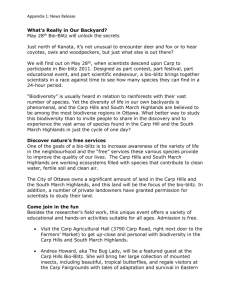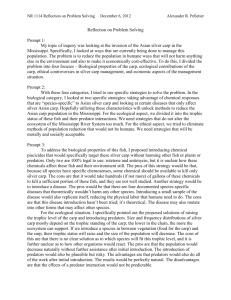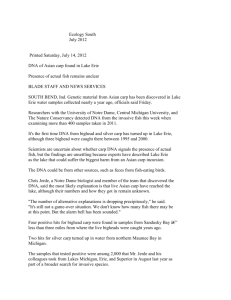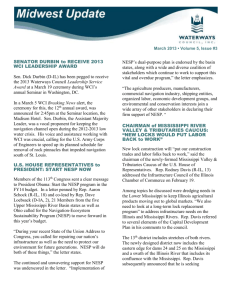Analysis of 2013 Federal Budget
advertisement
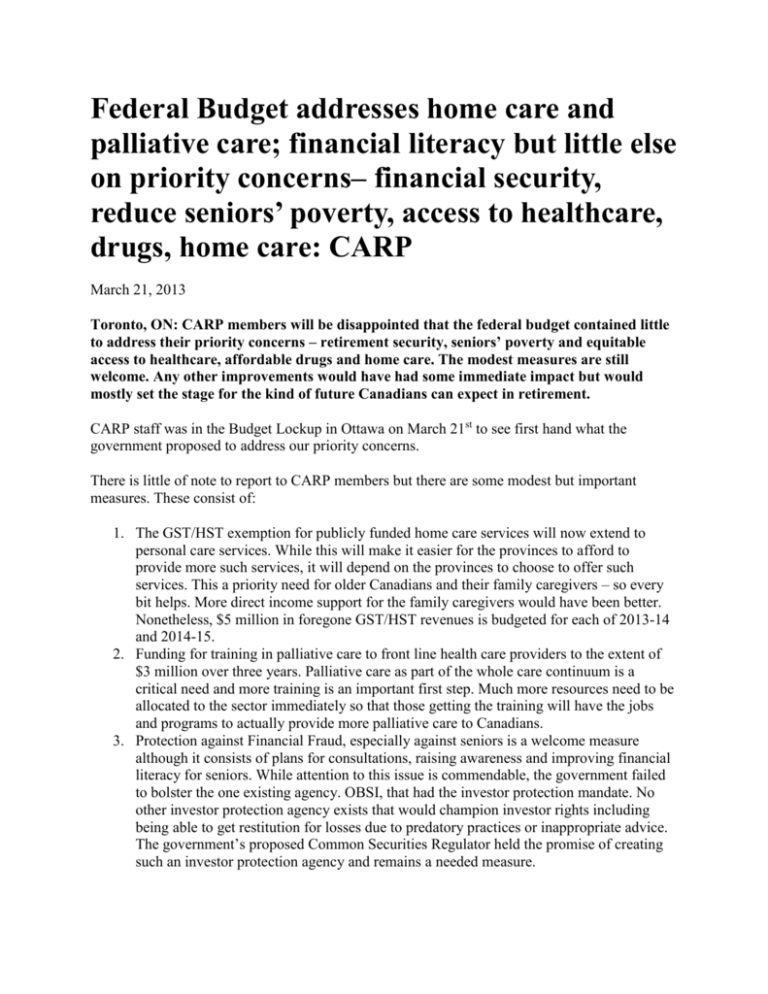
Federal Budget addresses home care and palliative care; financial literacy but little else on priority concerns– financial security, reduce seniors’ poverty, access to healthcare, drugs, home care: CARP March 21, 2013 Toronto, ON: CARP members will be disappointed that the federal budget contained little to address their priority concerns – retirement security, seniors’ poverty and equitable access to healthcare, affordable drugs and home care. The modest measures are still welcome. Any other improvements would have had some immediate impact but would mostly set the stage for the kind of future Canadians can expect in retirement. CARP staff was in the Budget Lockup in Ottawa on March 21st to see first hand what the government proposed to address our priority concerns. There is little of note to report to CARP members but there are some modest but important measures. These consist of: 1. The GST/HST exemption for publicly funded home care services will now extend to personal care services. While this will make it easier for the provinces to afford to provide more such services, it will depend on the provinces to choose to offer such services. This a priority need for older Canadians and their family caregivers – so every bit helps. More direct income support for the family caregivers would have been better. Nonetheless, $5 million in foregone GST/HST revenues is budgeted for each of 2013-14 and 2014-15. 2. Funding for training in palliative care to front line health care providers to the extent of $3 million over three years. Palliative care as part of the whole care continuum is a critical need and more training is an important first step. Much more resources need to be allocated to the sector immediately so that those getting the training will have the jobs and programs to actually provide more palliative care to Canadians. 3. Protection against Financial Fraud, especially against seniors is a welcome measure although it consists of plans for consultations, raising awareness and improving financial literacy for seniors. While attention to this issue is commendable, the government failed to bolster the one existing agency. OBSI, that had the investor protection mandate. No other investor protection agency exists that would champion investor rights including being able to get restitution for losses due to predatory practices or inappropriate advice. The government’s proposed Common Securities Regulator held the promise of creating such an investor protection agency and remains a needed measure. 4. Older workers can also benefit from the Canada Job Grant providing matching funds for needed training. Together with the job match programs under the Third Quarter initiative from the 2012 budget, older workers will have a better chance at getting and keeping needed jobs. “These modest measures certainly acknowledge some of the important concerns that CARP members have identified – the need for more and better home care and palliative care. While primarily a provincial responsibility, federal leadership and funding is needed and the modest measures are welcome but insufficient on their own to make a material difference in how people today can access these services.” Said Susan Eng, VP Advocacy for CARP. “Financial literacy measures are certainly welcome and we look forward to working with the government to develop that measure. It will also be an opportunity to press for progress on the investor protection arm of he Common Securities regulator.” Added Eng CARP has called for broad policy shifts that would improve the quality of life for all Canadians as we age. Specifically, 1. 2. 3. 4. Universal Pension Plan to help Canadians save for their own retirement Income support levels that ensure that no senior lives in poverty, reverse OAS decision Stable funding and national standards for home care, caregiver support and end of life care Equitable access to affordable drugs regardless of postal code “The Federal Budget tells us what kind of country we will be living in and sets the fiscal [taxing and spending] priorities that determine whether people can adequately provide for themselves, get the help they need when they are ill and generally expect to live in dignity through their retirement. The social safety net has been fraying through neglect or deliberate government action. The question is what’s next, in which direction are we heading?” said Susan Eng, VP, Advocacy for CARP Government response has been mixed. After acknowledging that Canadians were indeed undersaving, the Pooled Registered Pension Plans [PRPPs] were established by the federal government but the provinces have been slow to follow suit. There has been modest enthusiasm for the PRPPs – considered flawed and inadequate by CARP members – and growing support for enhancement to the CPP in addition or instead of the PRPPs, most recently from Gerry McCaughey, the CEO of the CIBC http://www.newswire.ca/en/story/1117061/cibc-ceo-calls-foradditional-voluntary-contributions-to-cpp-to-reignite-culture-of-savings who called for a voluntary layer to the CPP – a proposal which parallels CARP’s UPP. CARP has welcomed the GIS top-up provided in the 2011 federal budget for 680,000 of Canada’s worst off seniors. More is needed to ensure that no senior lives in poverty. Especially hard hit are single seniors. However, in the 2012 budget, the federal government announced plans to raise the eligibility age for Old Age Security [OAS], which CARP members rejected immediately and continue to call for a reversal of that decision. In the interim, CARP has called on the federal government to fund support for those unable to wait the extra two years for their OAS and GIS. In the 2012 budget, the government committed to funding the provinces for any expenditures incurred to address the needs of people who could not wait the extra two years. However, no plans are in place at the provincial level. The government should provide some assurance for those facing serious financial need as they reach retirement. The lack of federal involvement to replace the expiring Health Accords has the potential to further fracture the standards and access to affordable home care, support for caregivers and quality end of life care. CARP has called for national standards, better coordination and stable funding which requires federal involvement and funding and is now advocating its One Patient model to each province. http://www.carp.ca/2012/09/21/carp-proposes-new-outlook-onhealthcare/ Drug costs continue to climb forcing many to forego or limit treatment. http://www.carp.ca/2012/10/05/carp-health-care-update-report/ Drug coverage for seniors varies wildly among provinceshttp://www.carp.ca/2012/09/20/the-case-for-a-nationaldrug-strategy/. Government and household spending on drugs is becoming unsustainable. A dramatic restructuring of how drugs costs are regulated and funded holds the promise of providing first dollar drug coverage to all Canadians on an income tested basis [Pharmacare].http://www.carp.ca/2010/09/23/study-calls-for-universal-pharmacare-plan/ CARP is a national, non-partisan, non-profit organization committed to advocating for a New Vision of Aging for Canada, social change that will bring financial security, equitable access to health care and freedom from discrimination. CARP seeks to ensure that the marketplace serves the needs and expectations of our generation and provides value-added benefits, products and services to our members. Through our network of chapters across Canada, CARP is dedicated to building a sense of community and shared values among our members in support of CARP’s mission. For further information, please contact: Sarah Park 416.607.2471 Media Relations, Policy Researcher and Coordinator s.park@carp.ca Michael Nicin 416.607.2479 Director of Policy m.nicin@carp.ca Pam Maher 416.607.2475 Communications coordinator p.maher@carp.ca for Susan Eng Vice President, Advocacy CARP, A New Vision of Aging for Canada or visit our website: www.carp.ca

